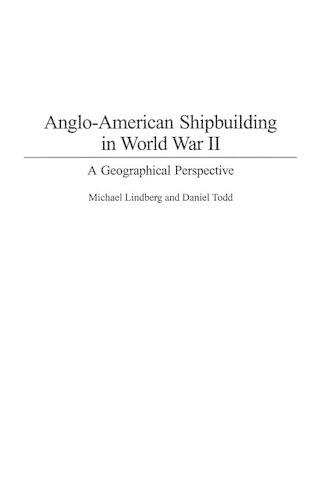
Anglo-American Shipbuilding in World War II: A Geographical Perspective
(Hardback)
Publishing Details
Anglo-American Shipbuilding in World War II: A Geographical Perspective
By (Author) Michael Lindberg
By (author) Daniel Todd
Bloomsbury Publishing PLC
Praeger Publishers Inc
30th December 2004
United States
Classifications
Tertiary Education
Non Fiction
338.47623820094109044
Physical Properties
Hardback
246
Width 156mm, Height 235mm
482g
Description
The expansion of the shipbuilding industry in Britain and the United States between 1938 and 1945 was one of the greatest economic feats in history. This study examines in detail the unprecedented growth both in total industrial capacity and that of individual shipyards. Lindberg and Todd go beyond the normal descriptive historical account of this expansion to analyze it through the application of a geographical perspective. Specifically, they apply the geographic concepts of clustering and agglomeration to the merchant and naval shipbuilding industries of both nations during this vital era. Beginning with the emergence of a modern shipbuilding capability in the late nineteenth century, the authors examine how these geographic concepts were progressively implemented in both the United States and Britain as a result of new technological demands on navies as well as changing geostrategic considerations. While World War I marked the initial large-scale example of clustering/agglomeration, the interwar period would witness a quick demise of both the industry and the major shipyard agglomerations. This important work explains how, as a result of the war, the governments and the shipbuilding industries of two nations were able to reconstitute and greatly expand their capabilities in the face of ever-increasing demands for both warships and merchant vessels.
Reviews
[A] detailed study of merchant and naval ship-building in the United States and Great Britain over the entirety of the twentieth century....[p]rovides an excellent overview of this broad scene.-EH.NET
[T]his is a useful overview of an industrial phenomenon of the first half of the twentieth century, reflecting the strength of economic and industrial history in the field.-The Northern Mariner
[W]ell-written and researched....[t]he reader will learn a great deal from this book in the comparative sense. That is its strength, when so often before separate studies of development have held sway.-International Journal of Maritime History
"A detailed study of merchant and naval ship-building in the United States and Great Britain over the entirety of the twentieth century....provides an excellent overview of this broad scene."-EH.NET
"This is a useful overview of an industrial phenomenon of the first half of the twentieth century, reflecting the strength of economic and industrial history in the field."-The Northern Mariner
"Well-written and researched....the reader will learn a great deal from this book in the comparative sense. That is its strength, when so often before separate studies of development have held sway."-International Journal of Maritime History
"[A] detailed study of merchant and naval ship-building in the United States and Great Britain over the entirety of the twentieth century....[p]rovides an excellent overview of this broad scene."-EH.NET
"[W]ell-written and researched....[t]he reader will learn a great deal from this book in the comparative sense. That is its strength, when so often before separate studies of development have held sway."-International Journal of Maritime History
"[T]his is a useful overview of an industrial phenomenon of the first half of the twentieth century, reflecting the strength of economic and industrial history in the field."-The Northern Mariner
Author Bio
MICHAEL LINDBERG is Associate Professor of Geography at Elmhurst College. His interests include naval and military geography, geopolitical analysis and naval history. He is a LCDR in the U.S. Naval Sea Cadet Corps and is author of Geographical Impact on Coastal Defense Navies: Brown, Green and Blue-Water Fleets and Shipbuilding Industries (both with Daniel Todd) and The Persian Gulf Naval Arms Race: Myth or Reality. DANIEL TODD is Professor in the Geography Department at the University of Manitoba. He is the author of nine books, including two with Michael Lindberg, and numerous journal articles. His research interests include economic geography with a strong concentration in East Asian topics.
